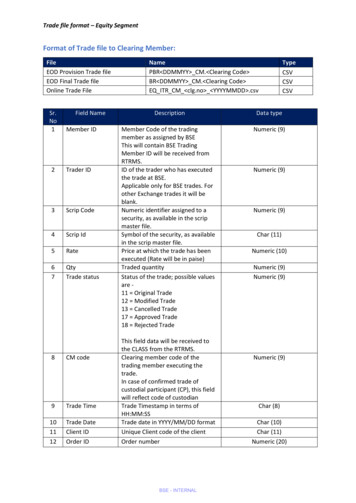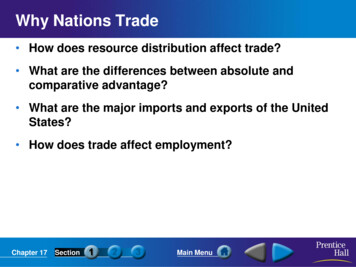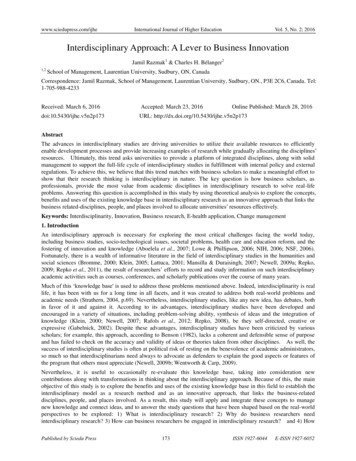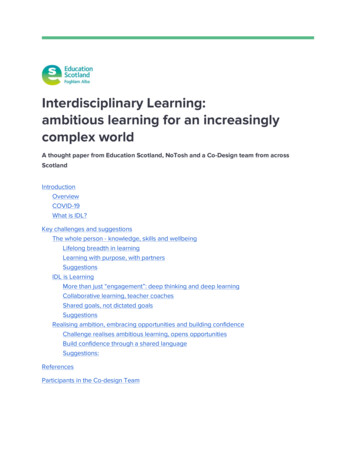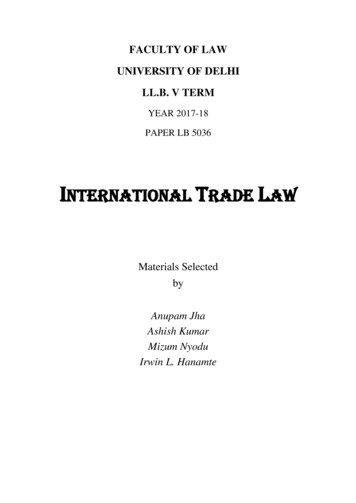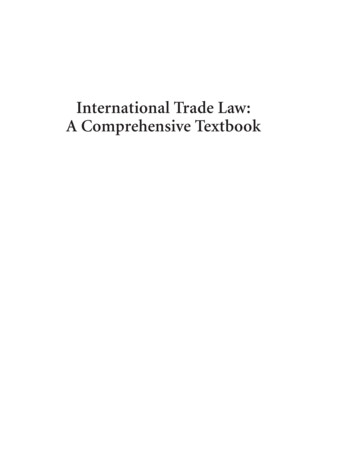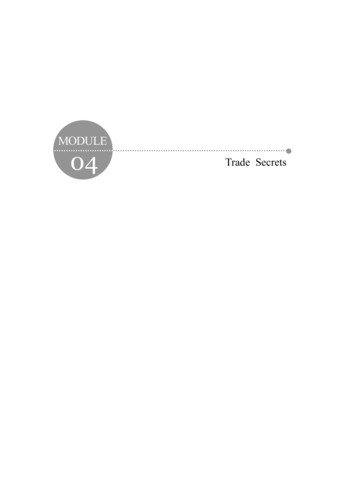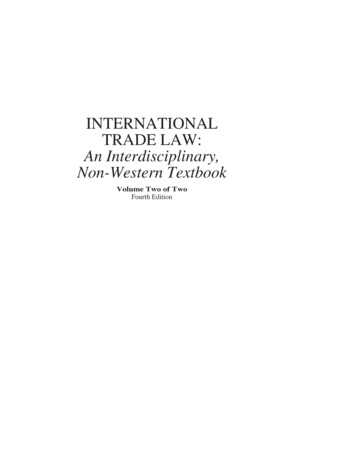
Transcription
INTERNATIONALTRADE LAW:An Interdisciplinary,Non-Western TextbookVolume Two of TwoFourth Edition
LexisNexis Law School PublishingAdvisory BoardPaul CaronProfessor of LawPepperdine University School of LawBridgette CarrClinical Professor of LawUniversity of Michigan Law SchoolSteven I. FriedlandProfessor of Law and Senior ScholarElon University School of LawCarole GoldbergJonathan D. Varat Distinguished Professor of LawUCLA School of LawOliver GoodenoughProfessor of LawVermont Law SchoolJohn SpranklingDistinguished Professor of LawMcGeorge School of Law
INTERNATIONALTRADE LAW:An Interdisciplinary,Non-Western TextbookVolume Two of TwoFourth EditionRaj BhalaWikipedia Entry:http://en.wikipedia.org/wiki/Raj BhalaAssociate Dean for International and Comparative Law,and Rice Distinguished ProfessorThe University of Kansas, School of LawLawrence, Kansas, U.S.A.International Legal Consultant,The Al Ammari Law Firm, Bahrain and Saudi ArabiaIn Association with Blake, Cassels & Graydon LL.P., CanadaMember,India:All India Law Teachers CongressIndian Society of International Law (Life)England:Royal Society for Asian AffairsUnited States:Fellowship of Catholic ScholarsCouncil on Foreign RelationsAmerican Law Institute
Print ISBN: 9780769869094Looseleaf ISBN: 9780769869124Library of Congress Cataloging-in-Publication DataBhala, Raj., author.International trade law : an interdisciplinary, non-Western textbook / Raj Bhala, Associate Dean for International andComparative Law & Rice Distinguished Professor, The University of Kansas School of Law. -- Fourth Edition.pages cmIncludes index.ISBN 978-0-7698-6908-7 (hardbound vol.1) -- ISBN 978-0-7698-6909-4 (hardbound vol.2) 1. Foreign traderegulation--Cases. I. Title.K3943.B49 2015343.08’7--dc232015021001This publication is designed to provide authoritative information in regard to the subject matter covered. It is soldwith the understanding that the publisher is not engaged in rendering legal, accounting, or other professionalservices. If legal advice or other expert assistance is required, the services of a competent professional shouldbe sought.LexisNexis and the Knowledge Burst logo are registered trademarks of Reed Elsevier Properties Inc., used underlicense. Matthew Bender and the Matthew Bender Flame Design are registered trademarks of Matthew BenderProperties Inc.Copyright 2015 Matthew Bender & Company, Inc., a member of LexisNexis. All Rights Reserved.No copyright is claimed by LexisNexis or Matthew Bender & Company, Inc., in the text of statutes, regulations,and excerpts from court opinions quoted within this work. Permission to copy material may be licensed for a feefrom the Copyright Clearance Center, 222 Rosewood Drive, Danvers, Mass. 01923, telephone (978) 750-8400.NOTE TO USERSTo ensure that you are using the latest materials available in this area, please besure to periodically check the LexisNexis Law School web site for downloadableupdates and supplements at www.lexisnexis.com/lawschool.Editorial Offices630 Central Ave., New Providence, NJ 07974 (908) 464-6800201 Mission St., San Francisco, CA 94105-1831 (415) 908-3200www.lexisnexis.com(2015–Pub.3069)
DedicationFor Shera and Her Generation,That They Are Not Scourged by a Clash of Civilizations,But Rather Blessed by Peace through Trade,And for the Glory of Godiii
Worldwide Praise for this TextbookFrom the United States—“In my experience, few books set a first rate standard for students and teachers alike. ThisTextbook does. Its interdisciplinary, non-western orientation, coupled with its coverageof time-honored precepts and contemporary issues, is a novel and timely synthesis.”Jagdish N. BhagwatiUniversity Professor (Economics, Law, and International Affairs)Columbia University“I have followed this ambitious Textbook since its 1st edition, which I adopted atColumbia Law School. It presents the canon of International Trade Law, both theory andpractice at the multilateral, FTA, and domestic levels. Having negotiated trade, environment, and human rights agreements for the U.S., chairing the U.S. International ReligiousFreedom Commission, and specializing also in Japanese law, I admire its coverage oftrade-related ‘linkage’ issues, and its emphasis on the Asia-Pacific region. It is a pleasureto endorse a work of such fine pedagogy, indeed, of serious scholarship.”Michael K. YoungPresidentThe University of Washington“This Textbook sets the standard for world-class excellence. First, it synthesizes law withinternational trade and development economics, explaining and analyzing vital insightsand empirical evidence that affect trade law and policy everyday around the world.Second, it takes first and second best solutions seriously, covering not only multilateraltrade liberalization in Volume One, but also free trade agreements and customs unions inVolume Two. Third, it moves well beyond traditional tariff and non-tariff barriers, to 21stcentury behind-the-border protectionist measures, such as technical barriers to trade,sanitary and phytosanitary measures, and state owned enterprise behavior. Fourth, itadmirably emphasizes trade law and policy in developing and least developed countries,including India. For the serious student of the field, there simply is no substitute for thisTextbook.”David A. GantzSamuel M. Fegtly Professor of LawDirector, International Trade Law ProgramRogers College of LawThe University of Arizona“This Textbook was an early leader in broadening the field to include a range ofperspectives and disciplines. Such an approach is essential in today’s complex and diversev
Worldwide Praise for this Textbooklegal environment, in which Trade Law regulates a global economy and students maypractice anywhere in the world. The book remains a standard in its incorporation ofmultiple paradigms, not only conventional efficiency-based Neo-Classical economics, butalso compelling normative approaches to social justice. There is much here for anystudent, teacher, or practitioner, regardless of her approach to Trade Law.”Frank J. GarciaAssociate Dean for Global InitiativesProfessor of LawBoston College“With this 4th edition of his Textbook on International Trade Law, Professor Bhala, oneof the world’s leading scholars in International Trade Law, has produced something ofvery special value for and deserving of widespread attention by academics, law andeconomic students, policymakers, and professionals in the area. This Textbook most ablyexplains the technical details of the complex and expanding matrix of interdisciplinarysubject-matter comprising International Trade Law, while simultaneously providing the‘big picture’ from the perspectives of both the developed and developing countries. Fromthe intricacies of dumping margin calculations and rules of origin, to the divergentconcepts of trade theory, to the views of Saint Thomas Aquinas on the ethics of traders,to the special interests of the BRICS, its pages are a mastery of synthesis and ofintellectual and practical nourishment. This Textbook clearly will be of enduring value,spanning classic GATT cases of the early 1950s to modern controversies like currencymanipulation. Simply put, this exceptional Textbook is a work of exhaustive and balancedscholarship and of great added-value for all those interested in the Trade Law arena. MyAmerican and international students (and I) have greatly benefitted from Professor Bhala’sprior three editions, and we will do so even more with this brilliantly executed 4th edition.Already students from over 100 law schools around the world have been enriched byProfessor Bhala’s prior edition, and I am fully confident this ‘global cadre’ will be furtherenlarged by this new edition.”Professor Joseph J. Norton, SJD, D. Phil, LLDJames L Walsh Distinguished Faculty FellowProfessor of Financial Institutions LawDedman School of LawSouthern Methodist University, andSir John Lubbock Professor of Banking LawUniversity of London (1993–2004)“Since NAFTA took effect in 1994, and the WTO in 1995, International Trade Law hasbecome a far broader, deeper specialty than ever before. New initiatives such as TPP andT-TIP raise new challenging issues, such as protection for biologics and investor-statedispute settlement. This Textbook is comprehensive and up-to-date in covering both theenduring themes and the details. Here, students and teachers enjoy the flexibility to coverthe entirety of the field, or focus intensely on topics within it. Either way, they will berichly rewarded by this very impressive work.”vi
Worldwide Praise for this TextbookGregory ShafferChancellor’s ProfessorSchool of LawUniversity of California, Irvine“This Textbook sets an absolute standard for top quality. It is extremely well researched,well balanced, and well written. Especially impressive is its synthesis of key conceptsfrom international trade and development economics, and political science, with classicand contemporary legal issues. From traditional tariff and non-tariff measures to emergingbehind-the-border barriers, from safeguards cases to Section 337 litigation, there is nosubstitute for this Textbook.”Beau Jackson, Esq.AttorneyAdduci, Mastriani & Schaumberg, LLPWashington, D.C.“It is rare to find a work on trade that is both comprehensive and truly international. I haverelied on this Textbook both to teach and apply principles of trade and development. It isa significant contribution to the field, and will have an impact on the way Trade Law istaught and practiced around the world.”Katrin KuhlmannPresident and FounderThe New Markets Lab,Adjunct ProfessorGeorgetown University Law CenterWashington, D.C.From Australia—“This book is what it sets out to be: Interdisciplinary and Non-Western. More than that,it is a book that encourages students to think. Sure, it works through all of the essentialblack letter law, the treaty provisions, and the case law across the entire field of WTO law,to help students become competent legal advisers. But, first of all, it exposes students tovarious perspectives on the objectives, functions, and impacts of the law with anespecially thorough introduction to economic analysis of trade. Then, it continues thatcritical inquiry by incorporating into each topic references to examples, case studies, andstories that bring the black letter law to life. It encourages students to think about law inits political, historical, and economic context — and also about how international lawmeshes with domestic law and politics. The choice of examples and case studies avoidsthe traditional focus of scholars on the U.S.A. and the European Community, and succeedsin explaining Trade Law in a truly international way. Diligent students of this text will beleft with an enduring sense of the importance of a legal system of trade relations, aconviction that this area of law really matters.”vii
Worldwide Praise for this TextbookDr. Brett WilliamsWilliams Trade LawSydney,External Lecturer in WTO LawFaculty of LawUniversity of Sydney,External Lecturer in WTO LawCollege of LawAustralian National University (ANU)CanberraFrom China—“There is a reason why I have prescribed this Textbook in jurisdictions all over the world,from the United Kingdom to Hong Kong. My students everywhere adore it, and I love it.The 4th edition is even better than its predecessor, with new chapters on balance ofpayments crises, climate change, export controls, trade adjustment assistance, and WorldTrade Organization accessions. The new chapter on ethics in trade practice, together withnew chapters on the public morality exception under GATT Article XX(a), are sure toimpress on students the importance of high standards of professional conduct. And whenit comes to intricate matters like the interpretation of market access and national treatmentcommitments in the four modes of cross-border services supply in a GATS Schedule ofConcessions, the explanations and illustrations provide simplicity without simplification.This Textbook is more than a laudable work of legal scholarship. It is a practical handbookfor all who work in International Trade.”Gonzalo Villalta PuigAssociate Dean (Research)Professor of LawVice Chancellor’s Outstanding Fellow of the Faculty of LawThe Chinese University of Hong KongHong Kong, SARFrom India—“India is the world’s largest free market democracy, and finally with this Textbook wehave a work for students, teachers, and practicing lawyers that takes India seriously.Spread across its pages is balanced coverage of legal and policy controversies involvingthe country, and Subcontinent, such as compulsory licensing of pharmaceuticals, patentevergreening, public stockpiling for food security and Green Box reform, invocation ofantidumping and countervailing duty remedies, reforms to trade, foreign direct investment, and foreign exchange laws, and strategies and tactics in multilateral and regionaltrade negotiations. Best of all, the Textbook conveys real passion for the subject.”Kishu DaswaniProfessor of LawGovernment Law College, Mumbai, andviii
Worldwide Praise for this TextbookProfessor of LawSt. Xavier’s College, Mumbai“This Textbook is world class in part because it is so user friendly. Its explanations,graphs, and tables are accessible to students with no background in the subject, yet itsinsights and analyses engage even the most seasoned veterans. Its coverage of majoremerging markets like the BRICS helps prepare students for new global realities. But,what makes this Textbook a masterpiece is its integration of economics, politics,philosophy, religion, and ethics with International Trade Law. As a result, the student notonly gains technical understanding essential for success in practice, but also becomes abroad-minded scholar.”Dr. Anupam JhaProfessor of LawUniversity of Delhi“In a word, this Textbook is ‘courageous.’ It treats not only the most complex technicalmatters in International Trade Law, but also the most controversial topics in the field. Itprobes all sides of each issue, showing the reader the perspectives of competingconstituencies in developed, developing, and least developed countries. Especiallynoteworthy is its sensitive, sensible discussion of human rights issues, includingsocio-economic, labor, and environmental matters, as they interact within the regime ofInternational Trade Law. Does trade liberalization advance or undermine those humanrights? Whether the reader plans a career in Private or Public International Law, thisTextbook is indispensable.”Dr. Shashi KumarSenior Assistant ProfessorDepartment of Human RightsSchool for Legal StudiesBabasaheb Bhimrao Ambedkar UniversityLucknowFrom Ireland—“I am happy to endorse this outstanding contribution to the growing number of works onInternational Trade Law. What distinguishes this work from its competitors is not only itscomprehensive coverage of WTO law, but also its treatment of preferential tradingregimes. It is also particularly rewarding to have a Textbook that moves beyond the legalcontent of trade to explore its economic, moral, and political dimensions, thus enrichingunderstanding in this area. Moreover, it emphasizes the increasing need to be familiar withthe emerging power of the Global South. A truly outstanding work.”Joseph A. McMahonDean and ProfessorUCD Sutherland School of Lawix
Worldwide Praise for this TextbookUniversity College DublinFrom Mexico—“I had the fortune to learn from this Textbook in its 2001 2nd edition, as a law student.It gave me and my cohorts the knowledge, skills, and inspiration to launch our careers,whether in trade or other specialties of international law. To have studied from it is a plusfactor for anyone entering or shifting into the field. Now in practice for over 10 years asan international transactional lawyer, I (and many others) rely on the new editions of theTextbook for the big picture and key details. Its coverage of NAFTA, as well as ‘secondgeneration’ FTAs like Colombia, Panama, KORUS, TPP, and T-TIP, is unparalleled. Itsuse in conjunction with the Dictionary of International Trade Law (also by ProfessorBhala) is efficient and rewarding.”Luis Fernando Gomar, Esq.PartnerThompson & KnightMexico CityFrom New Zealand—“As always, Raj Bhala offers thought provoking perspectives and fresh insights that showhow and why the international trade regime has become so contested. This latest Textbookis a timely and important contribution to today’s debate about the philosophy, ethics, andoutcomes that should shape this regime for the 21st century.”Jane KelseyProfessor of LawThe University of AucklandFrom Nigeria—“This Textbook is sorely needed throughout law schools in Africa, particularly Nigeria.When I did my LL.B. degree at the University of Nigeria in Nsukka, we did not have acourse in International Trade Law. Only in LL.M. studies at the University of Denver, andlater for my S.J.D. at the University of Kansas, did I encounter this Textbook. It was awonderful revelation! The emphasis of the Textbook on special and differential treatmentfor poor countries, and attention paid to Catholic Social Justice Theory, is especiallyappreciated. Using this Textbook certainly will help build legal capacity in Africa. Withthis Textbook and International Trade Law introduced in law schools throughout Africa,and Nigeria in particular, African countries will acquire priceless skills for a redefinedparticipation in international trade negotiations at the WTO.”Reverend Dr. (Father) Alphonsus IhuomaOwerri, NigeriaB.A. Philosophy (Rome), M.A. Theology (Rome), LL.B. (Nigeria),LL.M., (Denver), S.J.D. (Kansas)x
Worldwide Praise for this TextbookChaplainMayo ClinicRochester, MinnesotaFrom the United Arab Emirates—“I myself learned the subject of International Trade Law, and fell in love with it, thanksto this Textbook while an LL.M. student at the University of Arizona, and then an S.J.D.candidate at American University (Washington College of Law). Now as Dean andProfessor at Sharjah, my students use it, and I commend it to students throughout theMiddle East and beyond. No other work treats Arab Islamic countries in the world tradingsystem with such thought, vision, and hope. In addition to its insightful analysis ofsubstantive topics, the quality of English writing is so high that even native speakers willimprove their legal writing by perusing it. This Textbook inspires both the mind andheart.”Bashar H. MalkawiDean and Professor of LawCollege of LawUniversity of SharjahFrom the United Kingdom—“This Textbook is the testimony of the intellectual prowess of a scholar’s scholar in thefield of International Trade Law. The length and width of the subject are covered in clear,elegant prose, with topics organized and divided in a logical accessible manner that is adelight to read. Careful, indeed compassionate in the cosmopolitan spirit, attention is paidto problems faced by developing countries. Rightly so in the post-9-11 world, the linkbetween trade liberalization and national security is highlighted, and the theme of ‘peacethrough trade’ is critically explored. This Indian-American, visible as he is in the field ofrapid development, should take pride in serving the thankful world trade community withthis enlightening and user-friendly Textbook.”Dr. A.F.M. ManiruzzamanChair and Professor of International Business LawSchool of LawUniversity of Portsmouthxi
Table of AbbreviationsACPACSADAD AgreementADBADVANCE Democracy ActAECAAEOAFAAfDBAFL-CIOAFTAAgAGOAAgriculture AgreementAIDAIGALJAMAAmChamAMSAOGAORAPECARP Act of 2000ARRAASAASEANASPATAPATCATPAATPDEAATTAUVAfrican, Caribbean, and PacificAutomated Commercial SystemAntidumpingWTO Antidumping Agreement (Agreement on Implementation of Article VI of the General Agreement onTariffs and Trade 1994)Asian Development BankAdvance Democratic Values, Address Non-democraticCountries and Enhance Democracy Act of 2007Arms Export Control Act of 1976Authorized Economic OperatorAdverse Facts AvailableAfrican Development BankAmerican Federation of Labor-Congress of IndustrialOrganizationsASEAN Free Trade AreaAgricultureAfrican Growth and Opportunity Act (2000)WTO Agreement on AgricultureU.S. Agency for International DevelopmentAmerican Insurance GroupAdministrative Law JudgeAmerican Medical AssociationAmerican Chamber of CommerceAggregate Measure of SupportAll Other GoodsAll Others RateAsia Pacific Economic Cooperation (forum)Agricultural Risk Protection Act of 2000American Recovery and Reinvestment Act of 2009American Sugar AllianceAssociation of South East Asian NationsAmerican Selling Price1996 Agreement Concerning Certain Aspects ofTrade in Agricultural Products (1986 U.S.-IsraelFTA)WTO Agreement on Textiles and ClothingAndean Trade Preferences Act (1991)Andean Trade Promotion and Drug Eradication Act(2002)2013 U.N. Arms Trade TreatyAverage Unit Valuexiii
Table of AbbreviationsAVAVEB&OBBSBDCBDSBerne ConventionBFABILA (ILAB)BIABIS(1st meaning)BIS(2nd meaning)B.I.S.D.BITBJPBOPBOTBRICSBSE(1st meaning)BSE(1st meaning)BTA(1st meaning)BTA(2nd meaning)BTA(3rd udio-VisualAd Valorem EquivalentWashington State Business and Occupation Tax RateReductionBangladesh Bureau of StatisticsBeneficiary Developing CountryBoycott, Divestment, and Sanctions1886 (1971) Berne Convention for the Protection ofLiterary and Artistic WorksBanana Framework AgreementBureau of International Labor Affairs (U.S. DOLOTLA)Best Information Available(Pre-Uruguay Round U.S. term for Facts Available)Bank for International SettlementsBureau of Industry and Security (U.S. DOC)Basic Instruments and Selected DocumentsBilateral Investment TreatyBharatiya Janata PartyBalance Of PaymentsBalance Of TradeBrazil, Russia, India, China, and South AfricaBombay Stock ExchangeBovine Spongiform Encephalopathy (Mad Cow Disease)Bilateral Trade AgreementBio-Terrorism Act of 2002 (Public Health Securityand Bioterrorism Preparedness and Response Act)Border Tax AdjustmentMay 2007 Bipartisan Trade DealCentral American Free Trade Agreement-DominicanRepublicCommunity of Andean NationsCommon Agricultural Policy (EU)U.N. Convention on Biological DiversityCaribbean Basin Economic Recovery Act of 1983Caribbean Basin InitiativeCongressional Budget OfficeU.S. Customs and Border Protection (“U.S. CustomsService” until 1 March 2003)Canadian Border Services AgencyU.S. Conference of Catholic Bishopsxiv
Table of AbbreviationsCCC(1st meaning)CCC(2nd meaning)CCC(3rd meaning)CCICCLCCPCCPACCSCDC(1st meaning)CDC(2nd meaning)CDMCECCEPCERCETCETACFIUSC.F.R.(1st meaning)CFR(2nd meaning)CGECJCIACIF (c.i.f)CISADACITCITACITESCITTCMOCNLCOBRACommerce Country ChartU.S. Commodity Credit Corporation (USDA)Customs Cooperation Council (renamed WCO in1994)Countervailing Currency InterventionCommerce Control ListChinese Communist Party (or CPC, Communist Partyof China)U.S. Court of Customs and Patent Appeals (abolished1982; transfer to Federal Circuit)Carbon Capture and StorageU.S. Centers for Disease ControlChilean Distortions CommissionClean Development MechanismCommission for Environmental Cooperation(NAFTA)Constructed Export PriceCloser Economic RelationshipCommon External TariffComprehensive Economic and Trade AgreementCommittee on Foreign Investment in the UnitedStatesCode of Federal RegulationsCouncil on Foreign RelationsComputable General EquilibriumCommodity JurisdictionU.S. Central Intelligence AgencyCost, Insurance, and FreightComprehensive Iran Sanctions, Accountability, andDivestment Act of 2010U.S. Court of International Trade (New York, N.Y.)U.S. Committee for Implementation of Textile Agreements1973 Convention on International Trade in Endangered Species of Wild Fauna and FloraCanadian International Trade TribunalCommon Market Organization (EU)Competitive Need LimitationConsolidated Omnibus Budget and Reconciliation Act(multiple years)xv
Table of p Year 2001 ActCRSCSICTCCTDCTESSCTHCTHAC-TPATCTSHCUCustoms Valuation AgreementCUFTA (CUSFTA)CVCVACVDDDADDTCDFQFDGFTDHSDIFMERDM(1st meaning)DM(2nd meaning)DMADMZCoordinating Committee on Multilateral Export ControlsCost of Goods SoldCommon Market for Eastern and Southern AfricaCost of ProductionCircumstances of Sale (dumping margin calculationadjustment)Certified Public AccountantU.N. Central Product Classification listU.S. Consumer Product Safety CommissionCertificate of Quota EligibilityCrop Year 2001 Agricultural Economic AssistanceActCongressional Research ServiceContainer Security InitiativeChange in Tariff ClassificationWTO Committee on Trade and DevelopmentWTO Committee on Trade and Environment in Special SessionChange in Tariff HeadingWTO Chemical Tariff Harmonization AgreementCustoms-Trade Partnership Against TerrorismChange in Tariff Sub-HeadingCustoms UnionWTO Agreement on Customs Valuation (Agreementon Implementation of Article VII of the GeneralAgreement on Tariffs and Trade 1994)Canada-United States FTAConstructed ValueCanadian Value AddedCountervailing DutyDoha Development AgendaU.S. Directorate of Defense Trade Controls (Department of State)Duty Free, Quota FreeDirector General of Foreign Trade (part of Ministryof Commerce, India)U.S. Department of Homeland SecurityDifference in Merchandise (dumping margin calculation adjustment)Deutsche MarksDumping MarginDomestic Marketing AssessmentDe-Militarized Zonexvi
Table of AbbreviationsDOCDODDOEDOJDOLDOTDP (DPW)DPADRAMDSBDSMDSUEAEAAEAC(1st meaning)EAC(2nd meaning)EAC(3rd meaning)EAREBAEBOREC(1st meaning)EC(2nd meaning)ECATECBECC(1st meaning)ECC(2nd meaning)ECCNECEECFAECHRECJECLACE-CommerceEDEDIU.S. Department of CommerceU.S. Department of DefenseU.S. Department of EnergyU.S. Department of JusticeU.S. Department of LaborU.S. Department of TransportationDubai PortsDubai Ports WorldDeferred Prosecution AgreementDynamic Random Access MemoryWTO Dispute Settlement BodyDispute Settlement MechanismWTO Dispute Settlement Understanding (Understanding on Rules and Procedures Governing the Settlement of Disputes)Environmental AssessmentExport Administration Act of 1979East African CommunityEast Asian CommunityEnvironmental Affairs Council (CAFTA-DR)Export Administration RegulationsEverything But ArmsElectronic On Board RecorderEuropean CommissionEuropean CommunitiesEmergency Committee for Foreign TradeEuropean Central BankEnvironmental Cooperation Commission (CAFT-DR)Extraordinary Challenge Committee (NAFTA)Export Control Classification NumberEvaluation Committee of Experts (NAFTA)Economic Cooperation Framework AgreementEuropean Court of Human RightsEuropean Court of JusticeEconomic Commission for Latin America and theCaribbeanElectronic CommerceEconomic Development Administration (of DOC)Electronic Data Interchangexvii
Table of AbbreviationsEECEFTAEGAEIFENEPEPA(1st meaning)EPA(2nd meaning)EPZESCSESPERPET (EST)ETAETPETSEUEx-Im BankFACT Act of 1990 (1990Farm Bill)FAIR Act of 1996 (1996Farm Bill)FAOFASFASTFATAFBIFCICFCPAFDIFederal CircuitFed. Reg.FERCFFFICCIFINCENFMCSAFMVEuropean Economic CommunityEuropean Free Trade AssociationWTO Environmental Goods AgreementEnhanced Integrated Framework (formerly “IF,” or“Integrated Framework”)Explanatory NoteExport PriceEconomic Partnership AgreementU.S. Environmental Protection AgencyExport Processing ZoneEuropean Steel and Coal CommunityExporter’s Sales Price (Pre-Uruguay Round U.S. termfor Constructed Export Price)Effective Rate of ProtectionEastern Time (Eastern Standard Time)Employment and Training Administration (of DOL)Eastern Tropical PacificEmission Trading SchemeEuropean UnionU.S. Export-Import BankFood, Agriculture, Conservation, and Trade Act of1990Federal Agricultural Improvement and Reform Act of1996Food and Agricultural OrganizationForeign Agricultural Service (of USDA)Free And Secure TradeFederally Administered Tribal Areas (Pakistan)U.S. Federal Bureau of InvestigationU.S. Federal Crop Insurance Corporation (USDA)Foreign Corrupt Practices Act of 1977Foreign Direct InvestmentU.S. Court of Appeals for the Federal Circuit (Washington, D.C.)Federal RegisterU.S. Federal Energy Regulatory CommissionFrench FrancsFederation of Indian Chambers of Commerce andIndustryU.S. Financial Crimes Enforcement Network (Department of the Treasury)Federal Motor Carrier Safety AdministrationForeign Market Value (Pre-Uruguay Round U.S. termfor Normal Value)xviii
Table of AbbreviationsFMVSSFOAFOB (f.o.b.)FOPFPCFRANDFRCPFRCrimPFREFSA(1st meaning)FSA(2nd meaning)FSCFSRI Act of 2002 (2002Farm Bill)FTAFTAAFTAAPFTCFTZ(1st meaning)FTZ(2nd meaning)FYFXG7G8G20G33 (or ederal Motor Vehicle Safety StandardsFacts Otherwise AvailableFree On BoardFactors of ProductionU.S. Federal Power Commission (predecessor ofDOE)Fair, Reasonable, and Non-DiscriminatoryU.S. Federal Rules of Civil ProcedureU.S. Federal Rules of Criminal ProcedureU.S. Federal Rules of EvidenceU.S. Farm Services AgencyFood Safety Agency (EU)Foreign Sales CorporationFarm Security and Rural Investment Act of 2002Free Trade AgreementFree Trade Area of the AmericasFree Trade Agreement of the Asia Pacific RegionFree Trade Commission (NAFTA)Foreign Trade ZoneFree Trade ZoneFiscal YearForeign ExchangeGroup of Seven Industrialized NationsGroup of Eight Industrialized NationsGroup of Twenty Developed NationsGroup of 33 Developing CountriesGeneral and Administrative expensesGenerally Accepted Accounting PrinciplesU.S. Government Accountability OfficeGeneral Agreement on Trade in Bananas (15 December 2009)General Agreement on Trade in ServicesGeneral Agreement on Tariffs and TradeGulf Cooperation CouncilGross Domestic ProductGeographical IndicationGenetically Modified, Genetic ModificationGenetically Modified OrganismGross National HappinessGross National IncomeGross National Productxix
Table of AbbreviationsGOIGPAGPSGRIGPTGSMGSPGSP A(1st meaning)IA(2nd EEPAIFPRII
"With this 4th edition of his Textbook on International Trade Law, Professor Bhala, one of the world's leading scholars in International Trade Law, has produced something of very special value for and deserving of widespread attention by academics, law and economic students, policymakers, and professionals in the area. This Textbook most ably
